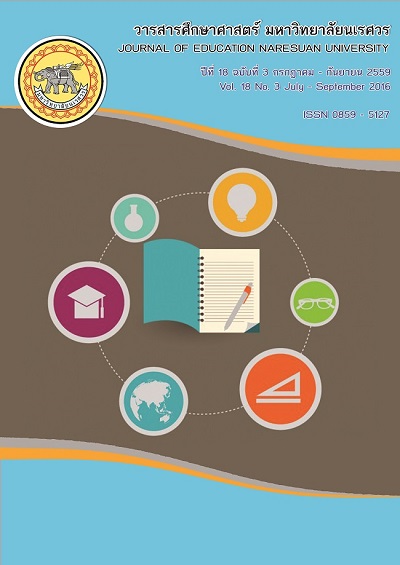การพัฒนารูปแบบการจัดการเรียนการสอนโดยการบูรณาการ สื่ออิเล็กทรอนิกส์ (INTEGRATED E-LEARNING COURSE) สำหรับนักศึกษาพยาบาลในระดับปริญญาตรี
Main Article Content
Abstract
ระบบเทคโนโลยีและสารสนเทศมีความสำคัญอย่างยิ่งในการเรียนรู้ในศตวรรษที่ 21 การวิจัยนี้มีวัตถุประสงค์ เพื่อพัฒนารูปแบบและศึกษาประสิทธิผลของการจัดการเรียนการสอนโดยบูรณาการสื่อ อิเล็กทรอนิกส์สำหรับนักศึกษาพยาบาลศาสตร์ ระดับปริญญาตรี กลุ่มตัวอย่างคัดเลือกแบบเฉพาะเจาะจงได้แก่ นักศึกษาพยาบาลระดับปริญญาตรี จำนวน 151 คน เครื่องมือที่ใช้ ได้แก่ แบบสอบถามข้อมูลทั่วไป แบบทดสอบผลสัมฤทธิ์ทางการเรียน แบบประเมินความพึงพอใจและแบบประเมินปัญหาและอุปสรรคของผู้เรียน วิเคราะห์ข้อมูลโดยใช้สถิติเชิงพรรณนาและการทดสอบค่าที แบบเป็นอิสระต่อกัน และข้อมูลเชิงคุณภาพ โดยการวิเคราะห์เนื้อหา ผลการวิจัย พบว่า 1) รูปแบบการจัดการเรียนการสอนทั้งแบบแทนที่ทั้งหมด และแบบนำมาประกอบกัน ต้องประกอบด้วย เนื้อหา และการเตรียมเนื้อหา กระบวนการในการเรียนรู้ การสื่อสาร และการวัดและการประเมินผล 2) ผลสัมฤทธิ์ทางการเรียนของกลุ่มนักศึกษาที่เข้าเรียนตามรูปแบบการจัดการเรียนการสอนผ่านสื่ออิเล็กทรอนิกส์แบบแทนที่ทั้งหมด (full/comprehensive replacement) มีค่าสูงกว่ากลุ่มนักศึกษาที่เข้าเรียนตามรูปแบบนำมาประกอบกัน (Hybrid type) อย่างมีนัยสำคัญทางสถิติ (p<.05) 3) นักศึกษามีความพึงพอใจโดยรวมในระดับปานกลางค่อนข้างสูง และพึงพอใจที่สามารถเรียนได้ทุกที่ ทุกเวลา 4) ปัญหาอุปสรรคพบว่าระบบเครือข่ายอาจเข้าถึงได้ยาก ผลการศึกษานี้ นับเป็นนวัตกรรมการเรียนการสอนสำหรับนักศึกษาในระดับปริญญาตรี เพื่อให้เป็นทางเลือกสำหรับการจัดการเรียนรู้ในศตวรรษที่ 21 ต่อไป
DEVELOPMENT OF THE INTEGRATED E-LEARNING COURSE FOR
UNDERGRADUATE NURSING STUDENTS
Technology and informatics systems are significant for learning in 21st century. This research aimed to develop an integrated e-Learning course for undergraduate students
(ie-Learning model) and to test its effectiveness. Purposively selected samples were 151 undergraduate nursing students. Instruments used were Demographic Data Forms, Study Achievement Forms, Learning Satisfaction Forms, and a Barrier and Obstacles in Learning Questionnaire. Descriptive statistics and t-test were used for quantitative data analysis and content analysis was used for the qualitative part. The results demonstrate that 1) both models (Hybrid and Full/Comprehensive replacement) of integrated e-Learning courses for undergraduate students must have content, content preparation, learning system, communication, and measurement and evaluation, 2) study achievement of full/ comprehensive replacement group were significantly higher than those of hybrid group (p<.05), 3) learning satisfaction were at a moderate to high level, where the satisfaction was related to “anytime/anywhere learning experience”, and 4) hard to access to the internet was counted as barrier for learning. The ie-Learning model from this study is a learning innovation for undergraduate students, which will be an alternative strategy for 21st century learning.
Article Details
The owner of the article does not copy or violate any of its copyright. If any copyright infringement occurs or prosecution, in any case, the Editorial Board is not involved in all the rights to the owner of the article to be performed.


